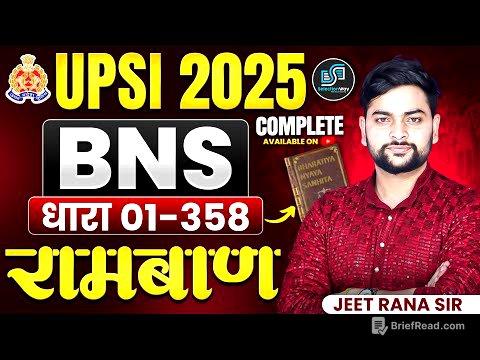TLDR;
This video explains intuition as a fast, unconscious problem-solving tool and how to improve it. It covers the importance of intuition, distinguishing it from insight, and provides strategies to enhance intuitive problem-solving skills, particularly in competitive programming and other fields. The video emphasizes the role of both practice and mental mapping in developing intuition, and addresses the influence of genetics versus experience on intuitive abilities.
- Intuition is a fast, unconscious problem-solving tool based on past knowledge.
- Improving intuition involves creating mental mappings between problem components and solution ideas.
- Both practice and mental mapping are crucial for developing intuition.
Intro [0:00]
The video introduces the concept of intuition as a fast and powerful intellectual tool that works unconsciously to solve problems. It draws a parallel between instantly recognizing a familiar smell and instantly recognizing solutions to familiar problems. The video aims to explain how intuition works and how it can be trained to solve challenging problems quickly, particularly in contexts like programming, coding interviews, math, chess, and real-life situations.
About me (my qualifications) [1:02]
The speaker establishes their credibility by mentioning their expertise in competitive programming and speed contests, attributing their success to a strong intuition. They highlight their achievement of reaching the top 10 percent in the USA Computing Olympiad (USACO) within three months using a combination of raw practice and an intuition-based strategy. The speaker notes that they will share more details about this intuition-based strategy later in the video.
What is intuition? [1:59]
Intuition is described as a function of the "fast side" of the brain, relying on fuel-based thinking and learned patterns that operate unconsciously. The effectiveness of intuition depends on the breadth of one's knowledge; the more knowledge absorbed, the more accurate intuition becomes. Intuition works by assessing whether previously successful solutions can be applied to a current problem, manifesting as a gut feeling. It is compared to a sixth sense, similar to how sight allows for the instant recognition of objects.
Intuition or insight? [4:07]
The video distinguishes between intuition and insight, clarifying that intuition relies on past knowledge for quick solutions, while insight involves deep, reflective thought to generate new solutions. Insight is described as a process where random thoughts can sometimes produce incredibly useful and novel ideas. The video focuses primarily on intuition as the main topic.
Why is intuition important? [4:46]
Developing intuition is important because it enables quick problem-solving, which is especially beneficial in time-sensitive situations. Strong intuition ensures that initial thoughts are more likely to be correct, guiding subsequent steps effectively. Without the right intuition, individuals may struggle despite strong reasoning skills, as conflicting intuitions can hinder progress.
How can you use intuition? [5:39]
To effectively use intuition, one must work with it rather than rely solely on it, as it provides initial ideas that need further development through reasoning. It's important to verify intuitive ideas with justification, proof, or examples, and to be aware that intuition can sometimes be incorrect. Logical thinking is essential for identifying and correcting misleading intuitions. While intuition is useful for recognizing familiar elements, it is less effective for entirely new situations.
How can you improve intuition? [7:55]
The speaker shares an intuition-based strategy used to rapidly improve in USACO: reading problems from higher divisions and immediately reviewing their solutions. This approach creates mental mappings between problem components and solution ideas. The strategy involves breaking down problems and solutions into memorable pieces, understanding the underlying associations, and explicitly testing intuition by guessing high-level ideas for new problems. Challenging oneself with difficult problems is also crucial for improvement.
Do smarter people naturally have stronger intuition? [12:38]
The video addresses whether smarter people have a natural advantage in intuition, arguing that while some may have an initial advantage, nurture plays a significant role. The ability to reason and intuit is largely based on past experiences, education, and exposure to challenging problems. Passion and motivation are crucial for improvement, and individuals should focus on cultivating interest in problem-solving to enhance their cognitive abilities.
Conclusion [16:00]
The video concludes by emphasizing that while the speaker's specific technique of memorizing solution ideas may not work for everyone, the key takeaway is the importance of creating mental mappings between problem components and solution ideas. It encourages viewers to believe in their ability to control their intelligence and improve their skills through practice and effort. The video also clarifies that while good practice is essential, incorporating the mental mapping strategy can further enhance intuition.









